Stephen King at the movies: We rank all 42 films based on his works
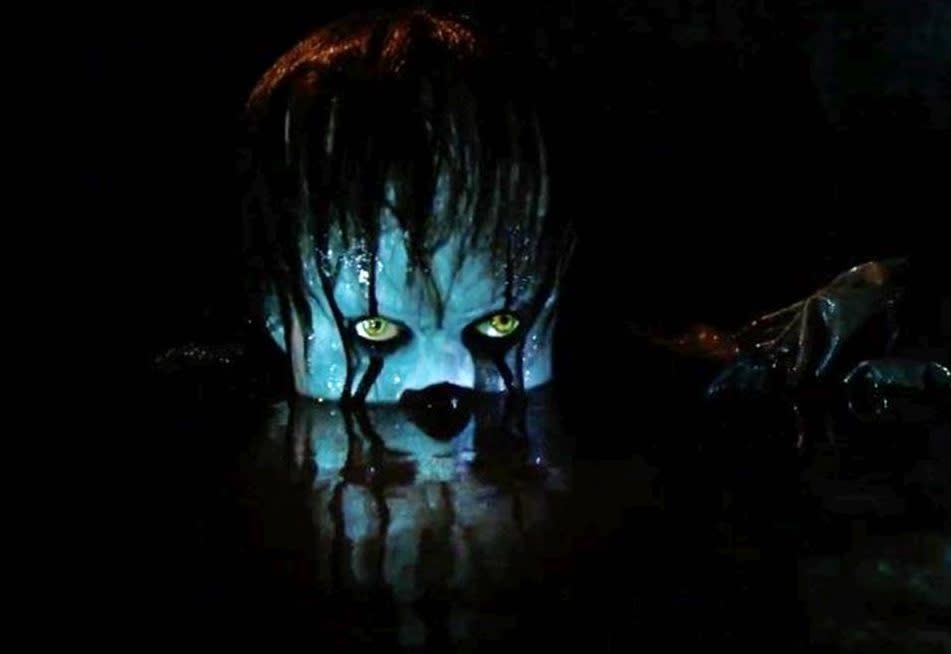
Few authors have seen their work adapted for the screen as often as master of horror Stephen King. After 40-plus years of cranking out books, we’ve tallied 42 feature films drawn from his tales of terror, suspense, mystery, and drama (excluding sequels and many, many, often lousy made-for-TV movies). With the arrival of It in theaters this week, we revisited and revised our ranking of his cinematic library, originally published in 2016, and added the most recent theatrical installments, It included. Here is our updated countdown of the memorably malevolent and macabre movies, from worst to first.
42. The Mangler (1995)
This mishmash of King clichés is all the more dispiriting given the peerless horror pedigree of its director, the late Tobe Hooper (The Texas Chainsaw Massacre), and costars Robert Englund (Freddy Krueger in many movie Nightmares) and Ted Levine (The Silence of the Lambs’ Buffalo Bill). Centered on an industrial laundry press machine possessed by a demon, the film lurches to and fro with a gracelessness made all the more egregious by the sheer silliness of its premise — complete with an embarrassing exorcism to halt the mechanical murderer.
41. Maximum Overdrive (1986)
Superior to King’s 1973 short story “Trucks” (which isn’t saying much), the film is notorious as the author’s first — and last — attempt at directing. It didn’t help that at the time, as King told interviewer Tony Magistrale in 2003, his drug use was an ongoing problem. On screen, Emilio Estevez leads a band of humans battling a fleet of big-rig trucks that, like the rest of Earth’s machines, are brought to murderous life by a passing comet. What follows is silliness of a purely campy order, driven by AC/DC’s hard-rock riffage, and marked by ludicrous thriller sequences that border on self-parody.
Watch the original trailer for ‘Maximum Overdrive’ featuring Stephen King:
40. No Smoking (2007)
From India, No Smoking is based on King’s short story “Quitters, Inc.,” which was previously adapted — with much stronger results — in 1985’s Cat’s Eye anthology (see No. 17). Though stripped of King’s mordant humor, the film never seems sure how seriously to take its story of a man who engages with a business that uses over-the-top — if not deadly — intimidation tactics to help clients kick the nicotine. It’s so haphazardly slapped together that it’s often impossible to follow.
39. Riding the Bullet (2004)
Mick Garris, the man behind many subpar TV-movie King adaptations (as well as Sleepwalkers; see No. 33), achieves something like a career nadir with this borderline-incoherent take on King’s 2000 novella, in which a death-obsessed Maine art student (Jonathan Jackson) sets out to visit his mother (Barbara Hershey) in the hospital on Halloween 1969, and hitches a ride with a malevolent driver (David Arquette). This sloppy effort is all cheap jolt scares, overcooked flashbacks, and excessive gore, a jumbled mess of gimmicks that are less terrifying than unintentionally funny.
38. Dolan’s Cadillac (2009)
Originally published in serialized form, and later collected in 1993’s Nightmares and Dreamscapes, King’s 1985 story is a punchy revenge yarn about a Las Vegas schoolteacher out to kill the mob boss who murdered his wife. Starring a dull Wes Bentley and a less-crazy-than-he-should-be Christian Slater, this hopelessly dreary and monotonous direct-to-video version squanders its lead actors and its premise via lifeless direction and a flat script.
37. Graveyard Shift (1990)
King’s short stories frequently lack enough meat on their bones to warrant a feature-length adaptation. Take this attempt, which stretches to the breaking point King’s 1970 tale about textile workers contending with a mysterious creature lurking in the tunnels connected to a plant’s abandoned basement. Whereas King’s prose elevates this standard-issue scenario, the film is merely a protracted series of formulaic loud-noise scares and gruesome deaths that can’t even be saved by the presence of the always-entertaining Brad Dourif.
36. Firestarter (1984)
Drew Barrymore is the titular pyrokinetic girl on the run from government agents (led by Martin Sheen) with her ESP-enhanced father (David Keith) in this adaptation of King’s passable-at-best 1980 tome. While there’s something strangely transfixing about the sight of George C. Scott as a ponytailed Native American CIA assassin driven to kill Barrymore’s paranormal kid, this chase-centric thriller simply lacks even a single credible moment. Its pointless story seems to exist only as an excuse to stage multiple conflagrations.
Watch young Drew Barrymore in an original trailer for ‘Firestarter’:
35. The Dark Tower (2017)
On its own terms, Nikolaj Arcel’s version of King’s eight-volume fantasy adventure is a formulaic dud cast in a Harry Potter-by-way-of-Last Action Hero mold, with a young boy (Tom Taylor) thrust into the center of a multiverse battle between aged gunslinger Roland (Idris Elba) and malevolent wizard The Man in the Black (Matthew McConaughey). More than its stock storytelling and substandard CGI, what truly undercuts this effort is its wholesale misunderstanding of the basic themes and characters of King’s novels, which here are so warped into mutated shape that — after years of various attempted adaptations — it makes one wish the project had remained in development purgatory.

34. Dreamcatcher (2003)
David Cronenberg might have been able to make something skin-crawlingly unique from the source novel, a hodgepodge of many of King’s favorite tropes. But as directed by Lawrence Kasdan, this big-budget adaptation pitting four psychically linked friends against rectally inclined alien invaders and government baddies is merely gross, sluggish, and one-note. A cast led by Morgan Freeman, Thomas Jane, Damian Lewis, Timothy Olyphant, and Tom Sizemore fails to salvage not-of-this-world action that amounts to an avalanche of empty sound and fury.
33. Sleepwalkers (1992)
Mick Garris’s take on a story written for the big screen by King is so over-the-top absurd it may feel more like a horror-tinged comedy. The title refers to a type of shape-shifting lifeforce-draining vampiric werecats, including a mother (Alice Krige) jealous of a budding romance between her son (Brian Krause) and a human girl. Alas, its connect-the-dots plotting is so lackluster it often feels downright inert. Krige has a phenomenally creepy presence, but the final showdown between the supernatural creatures and their sworn enemies — housecats! — is laughable.
32. The Night Flier (1997)
Yes, it gets some mileage out of its portrait of tabloid journalists and bloodsucking vampires as kindred spirits, as well as a full-on hammy performance from Miguel Ferrer as a cynical, world-weary muckraker who goes all-in to find a mysterious killer traveling to and from his crime scenes in a small plane. But the film’s made with such chintziness that any satiric objectives are ultimately overshadowed by the ugly visuals, cheap makeup and special effects, and dearth of scares.
31. Cell (2016)
Nine years after 1408 , John Cusack and Samuel L. Jackson reunite for some apocalyptic King horror with Cell, a zombie-esque saga whose few original moments are drowned out by hordes of familiar ones. Director Tod Williams’ cinematography and CGI effects are routinely shaky to the point of exasperation, and his story — which concerns a cellphone signal that turns people into hive-mind killers, and the few survivors of this global crisis — feels at once clumsily rushed and yet lacking in any propulsive suspense. As B-movies go, it’s adequate, but it lacks the spark that might separate it from the undead pack.
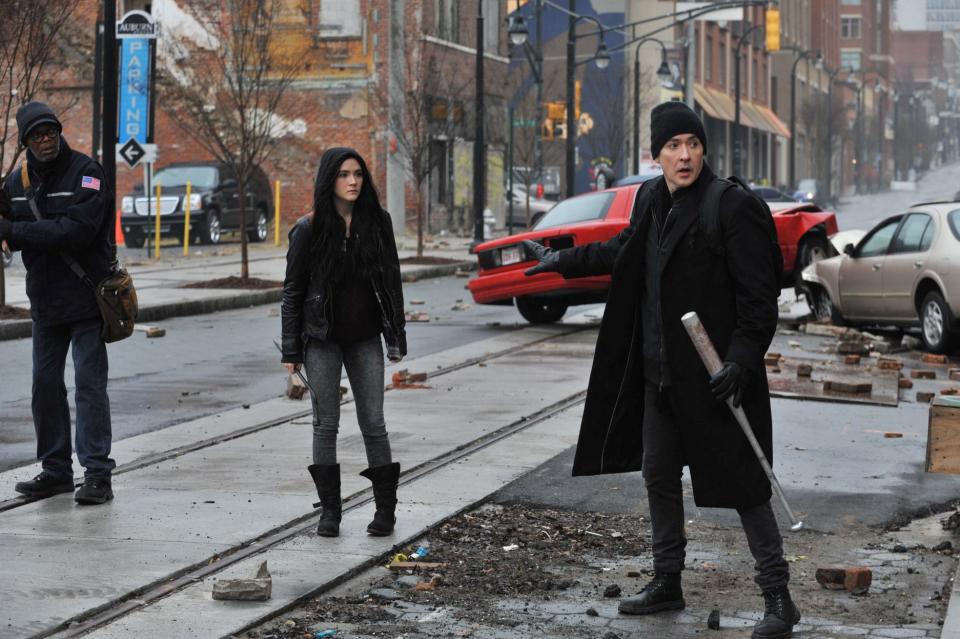
30. Hearts in Atlantis (2001)
The most intriguing aspect of King’s 1999 book, a collection of five loosely connected short stories set during the Vietnam era, is the link to the author’s Dark Tower series in its primary piece, Low Men in Yellow Coats. No such connections are made by this screen adaptation, which merely recounts the friendship that develops between a young boy (Anton Yelchin) and an older gentleman (Anthony Hopkins) who moves into his town and, it turns out, has psychic abilities. The ’60s period setting is nicely (if mawkishly) recreated, but this supernatural-ish coming-of-age tale suffers from a total lack of pressing verve.
29. Needful Things (1993)
Despite a fantastic cast including Max von Sydow, Ed Harris, Bonnie Bedelia, and the late, great J.T. Walsh, this adaptation of King’s 1991 novel falls in that dreadful middle ground between frightful and funny. As the proprietor of a new store that sells charmed items designed to make customers do his nefarious bidding, von Sydow strikes a suitably devilish pose. Yet whereas his villain’s attempts to destroy a small Maine enclave should be a vehicle for dark, biting social-commentary humor — or, you know, outright terror — it just plays as one mean prank after another, each more predictable and less engaging (and embellished with bad Satanic puns) than the last.
28. Thinner (1996)
An atonal thriller too jokey to be scary, and yet too mean-spirited and repugnant to be amusing, the film version of King’s 1984 novel (written under his Richard Bachman pseudonym) concerns a morally revolting — and obese — lawyer (Robert John Burke) who runs over a gypsy woman and is slapped with a curse that causes him to rapidly lose weight. While that setup seems ripe for any number of satirical takes, the film is too busy wasting time on chases, shootouts, and other mafia-related nonsense to exploit its central metaphor.
Watch the trailer for ‘Thinner’:
27. Dolores Claiborne (1995)
Having won an Oscar for her turn in Misery (see No. 19), Kathy Bates went back to the King well with this ponderous adaptation of his 1992 bestseller (written as one continuous first-person monologue) about a woman who, while being interrogated about the death of her employer, recounts her life story and, specifically, reveals the truth about the murder of her husband decades earlier. It’s a leaden central mystery, but that doesn’t stop director Taylor Hackford from treating it with the utmost solemnity. Bates and Jennifer Jason Leigh (as Dolores’s daughter) emote like crazy, but in terms of both acting and pacing, this return-of-the-repressed tale is a consistent slog.
26. Cujo (1983)
The final showdown between a crazed, rabid Saint Bernard and a mother (Dee Wallace) and her son (Who’s the Boss?’s Danny Pintauro) provides the only modicum of terror in this otherwise dreary adaptation of King’s (admittedly weak) 1981 novel. As with many King adaptations, the problem is one of visualizing the unspeakable — in this case, the idea of a possessed-by-evil pooch, which is far scarier to imagine than to see. What’s needed is the sort of directorial flair that John Carpenter brought to Christine (see No. 8). Instead, Lewis Teague employs visuals even flatter and less imaginative than the story itself.
25. A Good Marriage (2014)
The novella in King’s 2010 book Full Dark, No Stars that’s the basis for this film is a minor affair, so it’s no surprise that what’s on screen is rather thin. It does have a decent Joan Allen performance as the wife of a Maine businessman (Anthony LaPaglia) who, she soon learns, harbors a terrible secret. Unfortunately, that secret is obvious from the get-go, and the story’s post-revelation action plays out in a straightforward manner that could’ve used a dash of humor. The end result is a paint-by-numbers thriller whose every move feels as if it’s been borrowed from some past, better movie.
24. The Dark Half (1993)
Long-time King collaborator and admirer George A. Romero (Night of the Living Dead) brought this 1989 bestseller to the screen in a halfhearted effort that only skimmed the surface of its source material’s angry, vicious deviancy. A miscast Timothy Hutton is a literary author who’s found far greater success writing perverse crime novels under a pseudonym. When he retires that nom-de-plume, his alter ego materializes in the flesh, and — with metronomic predictability — begins committing grisly murders that are as ho-hum as the raft of symbolic gestures Romero employs to gussy up his fitfully engrossing action.
Watch the trailer for ‘The Dark Half’:
23. Tales From the Darkside: The Movie (1990)
While George A. Romero adapts King’s 1977 short story “The Cat From Hell” for this big-screen continuation of the TV series, it’s a far cry from the duo’s much better Creepshow anthologies (see Nos. 5 and 12). There’s some mildly wicked humor to be found in Romero’s script, about a pharmaceutical exec who — having tested drugs on thousands of cats — comes to believe that a black feline is cursed, and out for his blood. The rest of this middling collection, meanwhile, is most notable for a framing narrative starring an amusing Deborah Harry as a “Hansel and Gretel”-style witch.
22. The Green Mile (1999)
The second of director Frank Darabont’s three King adaptations (following The Shawshank Redemption and preceding The Mist) boasts a solid Tom Hanks lead performance and a well-drawn group of death-row characters. Regrettably, that’s not nearly enough to compensate for a preponderance of melodramatic schmaltziness and an ungainly central plot conceit — namely, a magical African-American behemoth (Michael Clarke Duncan, who somehow received an Oscar nomination for this role) who’s a simple-minded saint with the power to resurrect the dead. Shamelessly yanking on one’s heartstrings, it peddles non-stop bathos without realizing that Duncan’s ugly-stereotype character is both archaic and off-putting.
21. The Lawnmower Man (1992)
There’s next-to-no relationship between what’s on screen and Stephen King’s 1975 short story of the same name — in fact, King successfully sued producers because the finished film was so different from his own work. Thus, purely as an adaptation, count Brett Leonard’s sci-fi-horror effort as a failure. Measured on its own terms… well, it’s still not very good. That said, its then-cutting-edge virtual reality-style CGI, as well as its wacko headlining performance from Jeff Fahey (as a dim-witted gardener turned into a villainous super-genius by Pierce Brosnan’s scientist), mark it as an adequate time-capsule diversion.
20. Secret Window (2004)
King’s 1990 novella Secret Window, Secret Garden is one of his many riffs on the tangled, unhealthy relationship between artists and their work. David Koepp’s thriller turns it into the sort of pulpy throwaway that, on its own very limited terms, gets the job done. Johnny Depp stars as an author who, while working at a secluded cabin, is accused of plagiarism by another, increasingly unhinged writer (John Turturro). Little tension emerges from this setup, but Koepp’s serpentine camerawork and Depp’s embodiment of mounting paranoia, mania, and fury help make up for the ending’s obvious, telegraphed twist.
19. Misery (1990)
The only film based on a King story to win an Oscar, Rob Reiner’s adaptation was hailed largely for Kathy Bates’s turn as a lunatic romance novel fan who, upon finding her favorite author (James Caan) stranded after a car accident, holds him prisoner in her remote house, and forces him to resume writing her favorite series. Academy Award or no, Bates’s take is far too showy and over-the-top to register as legitimately unsettling, and Reiner’s decision to neuter his source material’s most violent moments to make it more palatable for mainstream audiences goes a long way toward diminishing its off-the-fandom-deep-end horror.
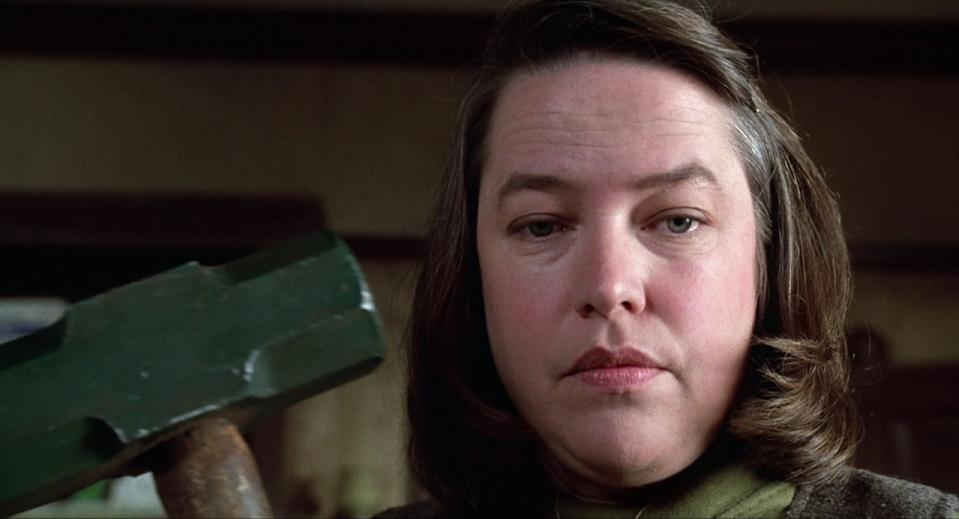
18. Silver Bullet (1985)
A vision of mounting community hysteria born from a string of unsolved murders, the film based on King’s 1977 novella Cycle of the Werewolf is often a clunky lycanthropic beast, especially during a first half in which too much time is spent on rural Maine characters of minimal interest. Still, Corey Haim is reasonably charming as a wheelchair-bound paraplegic boy determined to thwart the werewolf menace, and the combination of his protagonist’s movement-challenged condition — and the revelation about the identity of the animalistic creature — allows the film to culminate in suitably suspenseful fashion.
17. Cat’s Eye (1985)
After 1982’s Creepshow (see No. 5), King once again assumed anthology screenwriting duties for this triptych of tales — one original and two (“Quitters, Inc.” and “The Ledge”) based on entries from King’s first collection of short stories, 1978’s Night Shift. Cujo director Lewis Teague’s film — tethered together by the plight of a cat — is best served by its rendition of “Quitters, Inc.,” in which James Woods, in an attempt to stop smoking, visits a clinic whose aversion-therapy techniques are more than a little unconventional. Plus, it finally answers the question of whether cats are evil creatures that steal their slumbering master’s breath during a final installment involving Drew Barrymore and a troll.
16. Children of the Corn (1984)
Ignore the raft of awful sequels and remakes, and stick with the original 1984 adaptation of King’s 1977 short story. An adult couple (Peter Horton and Linda Hamilton) wind up in lethal trouble when they pass through a Nebraska town where a children’s cult — worshipping a malicious god known as “He Who Walks Behind the Rows” — slaughters adults in cornfield rituals. Far more cheesy than chilling, it’s nonetheless an entertaining entry in the killer-kids subgenre, largely thanks to Courtney Gains’s haunting turn as the cult’s vicious second-in-command, Malachai.
Watch the ‘Children of the Corn’ trailer:
15. Apt Pupil (1998)
There’s no supernatural monster hiding under the bed here — instead, evil exists within a young boy (Brad Renfro), and is slowly unleashed after he befriends a neighbor (Ian McKellen) who happens to be a Nazi war criminal in hiding. Expanding upon its source material, director Bryan Singer’s adaptation of King’s 1982 novella never quite delivers outright scares. Yet in its sharp conception of its characters’ twisted relationship, in which the line between innocence and iniquity becomes hopelessly blurred, it disconcertingly suggests that the capacity to commit horrific acts isn’t confined simply to otherworldly villains, but lurks within all — or, at least, too many — of us.
14. 1408 (2007)
Few paid much mind to this one, perhaps understandably given that it’s based on a 1999 story that sounds like a simple rehash of The Shining . That’s selling it short, however, as this drama — about an author (John Cusack) who stays in a supposedly haunted room at a New York City hotel and experiences all manner of supernatural phenomena — is a surprisingly sturdy King venture. That’s owed in large part to the satisfyingly pulpy performances from Cusack and Samuel L. Jackson as the hotel manager, as well as director Mikael Hafstrom’s knack for visually focusing on minor details in a way that effectively mirrors King’s own specifics-oriented prose.
13. Carrie (2013)
Given that it had already received an A-plus adaptation in 1976 courtesy of Brian De Palma, this 2013 remake by Kimberly Peirce (Boys Don’t Cry) was instinctively viewed with a wary eye. That’s a shame, given that Peirce’s version charts its own course by extending empathy to both telekinetic Carrie (Chlo? Grace Moretz) and her tormenter (Gabriella Wilde). Moreover, it casts its protagonist’s budding supernatural powers as a natural outgrowth of her own put-on circumstances, a stew of internal and external forces (physical, social, religious — the last courtesy of Julianne Moore’s bonkers mother) that conspire to turn her into a righteous angel of vengeance.
12. Creepshow 2 (1987)
George A. Romero and King reunited for a second go-round of EC Comics-style terror with this first-rate sequel, consisting of three fit-for-a-campfire stories. Two were written specifically for the screen, but “The Raft” was based on King’s 1982 short story, and that vignette — about four hot-to-trot kids out on a lake surrounded by a sentient, deadly oil slick-like creature — is far and away its high watermark, balancing teen-horndog energy and unexpected, inexplicable madness in a way that’s typical of King’s best writing.

11. Pet Sematary (1989)
It may not quite live up to King’s 1983 novel, but the movie delivers a wealth of memorably dreadful sights that linger in the mind long after its fantastically fiendish final shot. Recounting a Maine teacher’s misbegotten efforts to use a mystical burial ground to resurrect his killed-in-a-traffic-accident young son, this cautionary tale about grief and guilt is a slow-burner that truly picks up sinister steam in its last act, during which director Mary Lambert stages some of the most frightening child-related violence ever committed to film. You’ll never forget to check under the bed — and protect your Achilles’ heel — again.
10. It (2017)
King’s 1986 epic It runs 1,138 pages long, so it makes sense that for his big-budget adaptation, director Andrés Muschietti focuses only on the childhood-set half of the story — now set in the late 1980s. With a stellar cast of kids and an unnerving turn by Bill Skarsg?rd as Pennywise, Derry, Maine’s clownish embodiment of ancient evil, it’s an aesthetically polished abridgement of its gargantuan source material. Invariably, much is lost in translation, but Muschietti generates considerable creeping dread, and better still, he captures a potent sense of childhood trauma and camaraderie — as well as crafts a lingering atmosphere of inevitable death and decay.
Watch an exclusive behind-the-scenes look at the making of ‘It’:
9. The Shawshank Redemption (1994)
Frank Darabont’s take on King’s 1982 novella Rita Hayworth and the Shawshank Redemption may not be the all-time classic that some claim it to be, but its assured sense of time, place, and interpersonal relationships make it an enduring, heartrending story of survival and friendship. As prison inmates whose bond is forged through numerous hardships, Tim Robbins and Morgan Freeman (who also serves as narrator) have never been better, and Darabont shows an assured knack for revealing character details through alternately suspenseful and amusing dramatic scenarios. It may be the ultimate male-weepie.
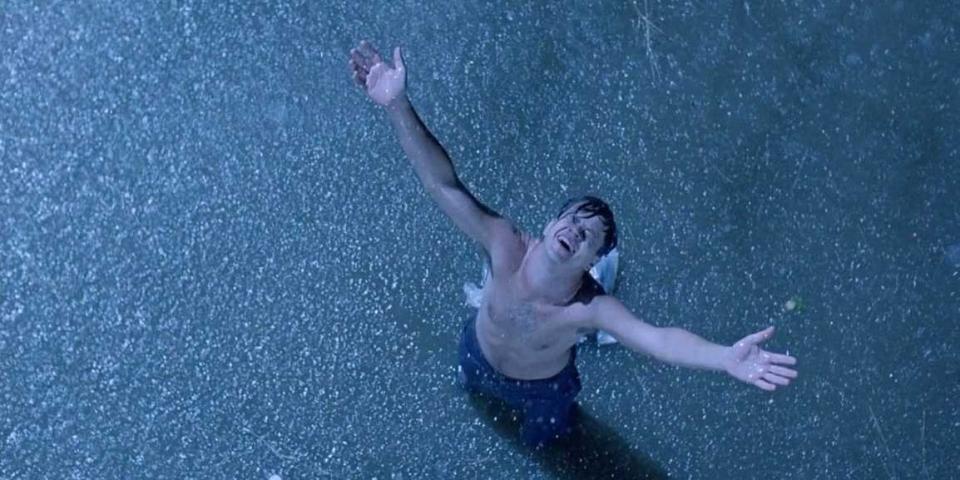
8. Christine (1983)
John Carpenter’s thriller is a marked improvement over King’s been-here, done-that novel, about an outcast teenager (Keith Gordon) whose life — and personality — takes a sharp turn for the malevolent after he purchases a red-and-white Plymouth Fury coupe. While the idea of an evil car corrupting its owner and murdering his enemies is more than a bit silly, Carpenter’s gorgeous widescreen visuals are extraordinary, turning the vehicle’s high beams into the stuff of bad dreams, and imbuing the car with a potent sense of personality. It’s the director’s authentic evocation of high-school social dynamics, however, that’s still its greatest legacy.
7. Stand by Me (1986)
King’s 1982 novella The Body is beautifully expanded to feature length by Rob Reiner in this coming-of-age gem about four pals (Wil Wheaton, River Phoenix, Corey Feldman, Jerry O’Connell) who set out to locate a corpse — an odyssey that leads to all manner of touching, funny, and harrowing manhood challenges and male-bonding experiences. The film’s lead performances are superb, and Richard Dreyfuss’s in-hindsight narration further imbues the proceedings with a melancholic sense of time’s ephemerality, and of the pain involved in first learning to face one’s own mortality.
6. The Running Man (1987)
King wrote this 1982 story under his early-career pseudonym Richard Bachman, and its bleak view of humanity’s bloodthirsty reality-TV future — still as prescient as ever — energizes this thrilling film version starring Arnold Schwarzenegger as a framed-for-murder soldier forced to compete on a game show (hosted by Family Feud’s Richard Dawson) where contestants must navigate an obstacle course populated by outlandish killers. Awash in amazing Ah-nold one-liners and marked by bleakly humorous action set pieces featuring psychotic villains (including two played by Jim Brown and Jesse “The Body” Ventura), it’s an all-too-relevant hybrid of cutting social commentary and outsized ’80s He-Man action.
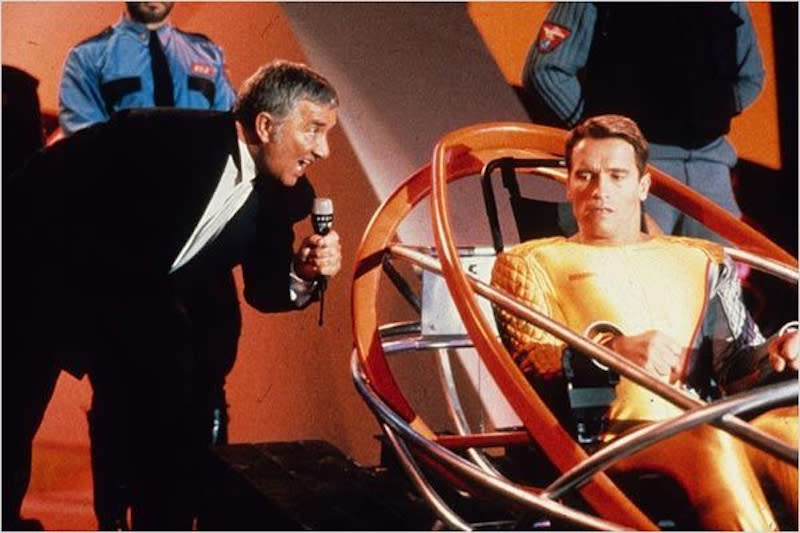
5. Creepshow (1982)
In his screenwriting debut, King collaborated with Night of the Living Dead auteur George A. Romero on this outstanding anthology inspired by EC Comics. It featured original King tales as well as two that King adapted from his own short stories (“Weeds” from 1976, “The Crate” from 1979). Blending dark comedy and macabre horror to ideal effect, this five-part collection of nightmares features King in his first big-screen performance (as a rube attacked by alien vegetation) and is highlighted by a Ted Danson-Leslie Nielsen segment that illustrates the potentially lethal downside to being buried in beach sand.
4. Carrie (1976)
The misery of being a social outcast and the volatile wrath of persecuted teens are terrifyingly dramatized by Brian De Palma in this tale of a young telekinetic girl (a mesmerizing Sissy Spacek) who’s abused at school by bullies (led by Nancy Allen and Amy Irving) and at home by her loony Christian-fundamentalist mother (Piper Laurie). Faithfully channeling King’s portrait of adolescent loneliness, anger, and yearning for acceptance, and marked by top-notch performances from Spacek, Allen, Laurie, and a young John Travolta, it culminates in a sterling sequence of prom-night bloodshed and hellfire that proves there’s nothing so furiously fearsome as a teen girl scorned.
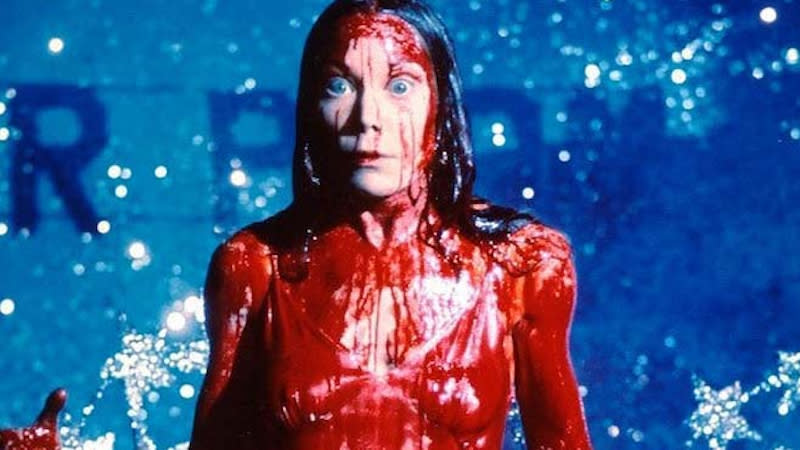
3. The Dead Zone (1983)
David Cronenberg chillingly brought to life King’s 1979 novel, about a rural schoolteacher (Christopher Walken) who, on the eve of beginning a promising romance, gets into a car accident that leaves him in a coma for five years. When he awakens, he’s lost his girl but gained the psychic ability to “see” visions of people’s deepest secrets. That gift becomes a curse when he learns a U.S. Congressman (Martin Sheen) running for office is destined to instigate nuclear war as president, thus setting in motion a race-against-time narrative that Cronenberg stages with nerve-jangling precision, and which a spellbinding Walken infuses with strange, somber pathos.
2. The Mist (2007)
Frank Darabont’s take on King’s 1980 novella received only a lukewarm reception upon release, but its depiction of small-town Maine life, and of community dynamics fraying under immense stress, is pitch-perfect King. With a riveting Thomas Jane as the everyman forced to keep townsfolk from losing their minds (and falling under the spell of Marcia Gay Harden’s religious nut) while trapped inside a supermarket surrounded by an unholy mist, this nasty masterwork details the fragile boundaries separating man from his most inhuman impulses, all while achieving a severe moral dimension via a finale that may be the most singularly, unforgettably mean movie ending ever.
1. The Shining (1980)
King famously loathed it ( and, apparently, still does ). Nonetheless, Stanley Kubrick’s adaptation of his 1977 novel — about a father who goes a little kill-crazy while spending the winter with his wife and psychic son at the Colorado Rockies’ Overlook Hotel — is not only the finest adaptation of the author’s work, but one of the all-time great horror films. Led by a maniacal Jack Nicholson as the writer’s block-plagued paterfamilias with an axe to grind, and marked by Kubrick’s meticulously unnerving direction, it’s a film whose unholy twins, ghostly bathtub specters, and blood-gushing elevator shafts help make it a classic haunted-house portrait of fatherly devotion run insanely amok.
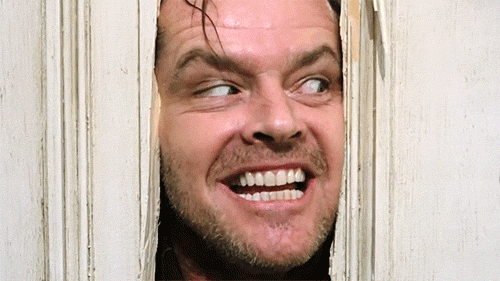
Read more from Yahoo Movies:
Stephen King on killer clowns, Stranger Things, and his secrets for scaring you silly
Stand by Me turns 30: The screenwriters on that R rating and showing the movie to Stephen King
